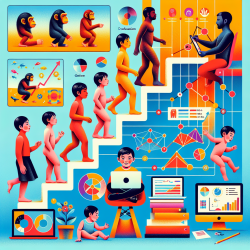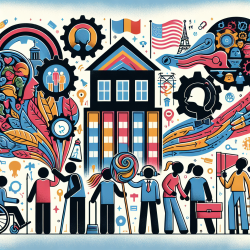Introduction
In the realm of child development and therapy, understanding the intricate interplay between biological and cultural influences is crucial. The recent research article, "The Epistemology of Evolutionary Psychology Offers a Rapprochement to Cultural Psychology," provides valuable insights into how evolutionary psychology can be harmonized with cultural psychology. This synthesis can significantly enhance the outcomes of therapeutic practices, particularly in online therapy services like those offered by TinyEYE.
Understanding the Research
The article by Saad (2020) challenges the traditional dichotomy between nature and nurture by illustrating how evolutionary psychology (EP) amasses evidence across cultures, time periods, and disciplines. This approach encourages a holistic understanding of human behavior, which is essential for practitioners aiming to improve their skills and outcomes in child therapy.
One of the key concepts introduced is the use of nomological networks of cumulative evidence. This method involves collecting data from diverse sources to build a comprehensive understanding of a phenomenon. For example, in understanding toy preferences in children, evidence from developmental psychology, endocrinology, and comparative psychology is synthesized to demonstrate that these preferences are not solely socially constructed but have biological underpinnings.
Practical Applications for Practitioners
For practitioners, incorporating these insights into therapy can lead to more effective interventions. Here are some ways to apply these findings:
- Data-Driven Decisions: Use evidence from multiple disciplines to inform therapy plans. This approach ensures that interventions are grounded in a robust understanding of child behavior.
- Understanding Cultural Contexts: Recognize that cultural differences in behavior can be adaptive responses to local environments. This awareness can help tailor therapy to better suit the cultural backgrounds of children.
- Interdisciplinary Collaboration: Engage with professionals from various fields to gain a comprehensive perspective on child development issues. This collaboration can lead to innovative solutions and improved therapy outcomes.
Encouraging Further Research
The synthesis of evolutionary and cultural psychology is a burgeoning field that holds great promise for enhancing child development practices. Practitioners are encouraged to delve deeper into this research area to continually refine their approaches. By staying informed about the latest findings, therapists can ensure they are providing the most effective and culturally sensitive care.
Conclusion
Incorporating the insights from evolutionary psychology into child therapy can lead to more nuanced and effective interventions. By understanding the biological and cultural dimensions of behavior, practitioners can better support the development of children in diverse contexts. For those interested in exploring this topic further, the original research paper offers a comprehensive overview of the epistemological framework that bridges evolutionary and cultural psychology.
To read the original research paper, please follow this link: The Epistemology of Evolutionary Psychology Offers a Rapprochement to Cultural Psychology.










